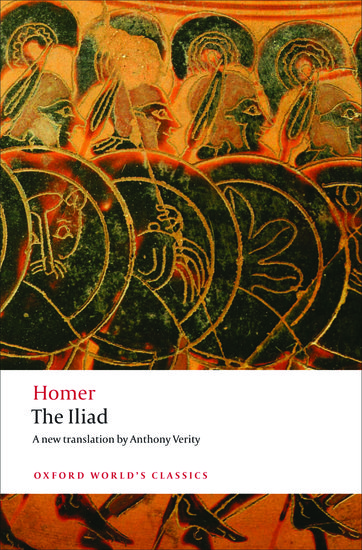
By Anthony Verity
Who needs another translation of Homer’s Iliad? There must have been hundreds of English versions since Chapman (c.1560-1634), a good many of them on bookshop shelves today. The usual answer is that great literature needs frequent reinterpretation. If students of antiquity and curious general readers are being urged today to return to the first work in writing in the Western canon, those who can read Greek will continue to translate the Iliad for their benefit, in the hope of recreating something of the “feel” of the original. It doesn’t do any harm, either, to have more than one version to browse among before buying. Teachers will choose a translation that captures what they think are the essentials of Homer; the casual reader may well go simply for a rattling good yarn.
Translation, as everyone knows, always fall short. All one can hope for is a degree of success. Homerists bring with them various kinds of baggage, among them: current views (if any) of what epic poetry should sound like in English; their own prejudices about what should be preserved, and what regretfully abandoned; and perhaps recent Homeric scholarship.
Dryden (1631-1700) aimed at a version of the Iliad “such as would have been composed by the original author were he alive now and writing in English.” Pope (1688-1744) latinized unfamiliar Greek gods, elided the rough corners of heroes’ gross conduct, and skated over Homer’s fascination with fatal wounds, all in the interests of poetic and social decorum. Neither was much interested in recreating a distant heroic world. “It is a pretty poem, Mr Pope,” said the Greek scholar Bentley, “but you must not call it Homer.” Indeed not; but it is a superb Augustan creation.
The Victorians were fascinated by Homer, possibly because, as George Steiner has observed, they saw in it qualities they admired: an ideal of virility and masculine intimacy, and also a portrayal of the good loser (Hector). Post-Romantics, they tried in various ways to transport their readers back to heroic times. Matthew Arnold (1822-1888), a better critic than translator, opted for clunky English hexameters in imitation of Homeric verse (“So shone forth, in front of Troy, by the bed of Xanthus / Between that and the ships, the Trojans’ numerous fires”). Lang, Leaf, and Myers’s prose version appeared at roughly the same time as Schliemann’s dramatic discoveries at Troy (1882). Once unkindly described as the Authorized Version meeting Morte d’Arthur (“Wherefore thus among the ships and through the camp do ye wander alone, in the ambrosial night; what so great need cometh over you?”), it is unusually faithful to the Greek, but often strained and obscure — as Homer never is — possibly even to generations of schoolboys for whom it was a popular crib.
Since then, most translators have tried to reproduce something of Homer’s heroic vitality, many of them seeking to reproduce Arnold’s famous four qualities of rapidity, plainness, directness, and nobility (the first three easier to catch today than the last). No one writes epic poetry any more (Christopher Logue’s strikingly successful poems are not translations but recreations based loosely on Homer), and we no longer have at hand an accessible elevated diction to describe great deeds. So we aim for a kind of middle register between colloquial and fustian, always mindful that something has to go. I like some modern versions, which often tell the tale with vigour and rapidity, though the teacher in me objects to imported material and beefed-up imagery, and the exclusion of essentially Homeric features such as repetition and fixed epithets. Nor can I take seriously a translator who thinks that Homeric language can “cramp and distort my own.” But translation isn’t one thing, and depends on what you set out to do.
My own starting principles were:
- To keep close to the Greek and let Homer speak as far as possible in his own words;
- To render line by line — for ease of reference, not because I thought I was writing poetry; my version is often fairly prosaic;
- To preserve echoes of heroic oral poetry, such as repetition, stock descriptions, and fixed epithets (“swift-footed Achilles; Hector, breaker of horses”);
- To follow where possible Homer’s syntax (“and…and…but…then…”);
- To translate just about every word (mainly for the benefit of students).
Other approaches are possible, and legitimate. Readers will judge for themselves. All one can hope for is that they will catch something of the immediacy and yet otherness of the original. And perhaps one or two will be impelled to learn Greek, which is the only way to read Homer with satisfaction.
Anthony Verity taught Classics in several schools in England, his last job being Master of Dulwich College. He has translated Theocritus and Pindar for Oxford World’s Classics, his OWC edition of The Illiad was published in September, and he is currently working on a version of Homer’s Odyssey.
For over 100 years Oxford World’s Classics has made available the broadest spectrum of literature from around the globe. Each affordable volume reflects Oxford’s commitment to scholarship, providing the most accurate text plus a wealth of other valuable features, including expert introductions by leading authorities, voluminous notes to clarify the text, up-to-date bibliographies for further study, and much more.
Subscribe to the OUPblog via email or RSS.
Subscribe to only classics and archaeology articles on the OUPblog via email or RSS.
View more about this book on the ![]()
![]()


There are many translations into Polish as well.
[…] and glory permalink buy now read more Posted on Saturday, May 18th, 2013 at 6:30 am […]
I recently read Mr Verity’s translation and I though it was much more readable than other modern editions like Fitzgerald’s or Fagles’. Looking forward to his Odyssey.